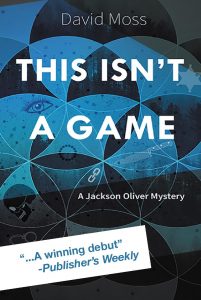Audiobooks: Finding the Best Narrator for Your Book
By Guest | January 15, 2017 |

photo by yat fai ooi via Flickr’s Creative Commons
Please welcome David Moss as our guest today. David is a freelance advertising copywriter whose debut mystery novel This isn’t a Game (Poisoned Pen Press) came out last year. He lives in Santa Monica, California.
I have a lot of experience producing audio voice tracks for commercials, and I think many writers who want to create audiobooks would benefit from learning about the relatively simple audio production process.
Audiobooks: Finding the Best Narrator for Your Book
Audiobook downloads increased by 38.1% in 2015. According to the Audiobook Publisher’s Association, audiobooks are the fastest growing segment of the publishing industry. But you don’t need stats in industry trade journals to tell you about the explosive growth of audiobooks. You just have to look around at people with smart phones listening to books at the gym, on walks, at the car wash.
With more people listening to audiobooks, more authors are creating them. Some have publishers who handle the production. On the other end of the spectrum, writers with a DIY ethos and good voice record the book themselves. For many, the Audiobook Creation Exchange (ACX), a service of Audible, is ideal. They find the appropriate narrator, handle production, and distribute the audiobook through Audible, Amazon, and iTunes. But ACX lowered royalty rates, leaving many authors looking for another way.
 This post will talk about a middle ground between recording your own audiobook and handing the entire task over to ACX. It will go over steps for finding and recording the narrator best suited to your book.
This post will talk about a middle ground between recording your own audiobook and handing the entire task over to ACX. It will go over steps for finding and recording the narrator best suited to your book.
Finding the Right Narrator
Voices vary as much as writing styles. There’s no such thing as a one-size-fits-all narrator. Do you want to give your book the James Earle Jones treatment or is a quirky, more conversational voice better suited as narrator of your book? The best way to find the ideal voice is to cast. No, the only way to find the ideal voice is to cast. Fortunately, voiceover databases make it easy to cast and hire narrators.
Voiceover Databases
I’ve spent much of my career in advertising, writing and producing radio spots. We used to record exclusively in LA studios. But the voiceover business, like every other business, has been disrupted by technology. Now you can find top-notch voice actors working out of their home studios, recording everything from tracks for industrial videos to on-hold messages to audiobooks. You’ll find them on the big voiceover databases like voices.com and voice123. I’m going to talk about voice123 because that’s what I use, but the same principles apply to all voiceover databases.
On voice123, you have two options:
- Post a casting project. Based on the parameters you select (gender, age, length of recording, budget) voice123 will invite actors to read a passage from your book and upload the auditions. You then select the actor whose read you like best and hire her. This seems like the simplest, most time-efficient way to go, but it’s not. You’ll be deluged with auditions. The best actors won’t bother with mass auditions since they realize the odds of you even hearing their audition aren’t good. So you end up with the former classic rock DJ with whiskey-shredded vocal chords, the person who can’t get her dog to stop barking in the background and someone regaling you with his Darth Vader impression.
Or, the better option is:
- Use the search feature to find actors based on your desired parameters. Male or female? What age range? What country? You can find good actors everywhere, but if you want a US narrator it’s not a bad idea to start your search with California and New York. Now listen to demo reels and pick a handful you like best. But make sure the actor has a well-equipped home studio. The actors’ Voice123 profile lists all their studio equipment. If someone plugs a snowball microphone into their laptop, you want to eliminate them even if the demo reels sounds professional since they may have recorded it at a professional studio.
After you select the reels you like, contact the actor directly. (Voice123 has an option for that.) You can also Google the actor’s name. If she has a professional website, you might prefer to contact her that way. (If you contact the actor through the Voice123 system, Voice123 does not take a percentage. They are paid by the actors.) Describe the project and the rate you’re offering and ask the actor if the job interests her. If it does, select a passage from your book and have the actor send you an audition. This is a standard business practice, and actors don’t charge for it. They expect to audition for jobs. Audition at least five different actors. If you’re not satisfied with any of them, audition more.
What Should You Expect to Pay?
I’ve hired actors to record commercials. I’ve never recorded something as long as an audiobook, so I’m not qualified to offer an opinion on appropriate audiobook rates. Do a little research. Ask other writers what they’ve paid. Narrators typically charge per finished hour (PFH) of audio. Rates vary from actor to actor. When you contact someone, don’t ask what she charges. Make an offer. If you want to save on upfront costs, you can offer a royalty split. Some actors will be receptive to this, others won’t. It’s also essential that the agreed upon price includes revisions. You make typos when you write. Actors slur or mispronounce words when they read. It’s inevitable.
Audio Editing Software
The narrator will provide you with an audio file of a dry (no sound effects) voice track. Do you want musical stings between chapters? Add them yourself. The most basic audio editing software (e.g. Garageband, Audacity) is free and relatively simple to master. It’s just one more element of control. You can import cover art, adjust the length of time between chapters, add chapter marks, compress the voice tracks and more.
So if you want to produce your own audiobook but don’t want to read it yourself, visit one of those voiceover databases and listen to demo reels. You might find the perfect narrator for your book.
What are your experiences with creating audiobooks? Have you attempted to do your own? Or selected your own narrator?










Thanks for this post.
I haven’t listen to audiobooks much but I’ve noted a marked difference between stories told in single first person point of you and those with several, rotating or limited third person POVs.
I’ve found stories that are written with a single ‘narrator’ are much easier to listen to on audio.
Stories that have scenes or chapters with differing narrators (men/women, protagonist/antagonist) seem to be a much greater challenge and often have been distracting or otherwise unsatisfying in my listening experience. I suspect the performance challenge is much greater in such books (i.e. Acting several parts). Am I alone in this perception? Any thoughts on this?
Do you have any tips on how to cast a narrator that can navigate stories with varied and multiple point of you characters?
Thank you!
Tom,
I agree. Audiobooks are most effective when the narrator becomes the voice of the protagonist.
But a skilled narrator can also handle multiple points of view. In the audiobooks I’ve heard, it sounds jarring when the narrator attempts to establish a new voice each time there’s a new chapter told through a new POV.
But the best way to know for sure is to test it out when you’re auditioning narrators. Select paragraphs from chapters told through different POVs, ask the narrator to vary the read, and see if you like it.
Thank you!
Great post idea! I’m in the DIY camp, as a former ham-actor and a writer who rigorously reads my drafts out loud anyway- that polishes the work and also gives me rehearsal for the eventual a-book. I highly recommend reading your work out loud, not because your story has to have a “once upon a time” feel, but because it surely will surface errors in the flow, better than any other way I know of.
I’m sharing so friends I know that have hired narrators can comment too.
My publishers let me help them choose the voice artist for my books, which was a lot of fun and made me feel connected.
I was going to do it myself but I’m so glad I didn’t since I don’t have the patience or the equipment!
Valuable information, David! Thank you. I listen to audio books often and agree that the narrator makes a huge difference.